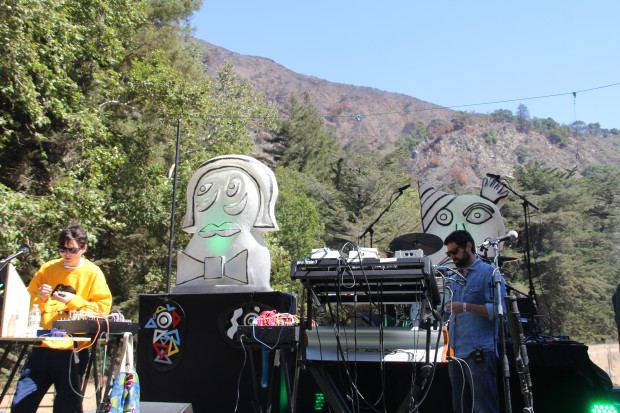“Magical realism is defined as what happens when a highly detailed, realistic setting is invaded by something too strange to believe. There is a reason magical realism was born in Colombia.”
These are the words that bookend the first two seasons of the hit Netflix show Narcos, a violent, action-packed dramatization of the life and times of cocaine kingpin Pablo Escobar. Those familiar with the works of Gabriel Garcia Marquez understand this description of the literary genre to be essentially true. The Columbian author of 100 Years of Solitude was famous for lacing his otherwise straightforward works with elements that seemed to be plucked from Tolkien, or perhaps from ancient myth.
Those familiar with the works of the late San Francisco writer Richard Brautigan will also understand the basic tenets of magical realism, even if they’ve never read a single word of Marquez. Although Brautigan’s novels, novellas and collections of poetry—from Trout Fishing in America to The Hawkline Monster—aren’t usually dubbed “magical realism,” the share similar aesthetic qualities.
In Watermelon Sugar tells of a normal man who finds himself in a psychedelic land, where the sun shines a different color every day. His first published novel, A Confederate General From Big Sur, follows the adventures of Lee Mellon—a wild bohemian character, who spends his days drinking whiskey and wrestling with alligators on either side of that rugged and beautiful stretch of Highway 1 known as Big Sur, California.
There is a reason Brautigan chose Big Sur as the setting for this story. He had become enchanted with the place—just as so many authors of his generation had. Henry Miller, Ken Kesey and Jack Kerouac spent time among its quiet redwood groves and along its craggy, cold beaches. To this day, the area remains remote and sparsely populated. Few roads off the highway are paved, cell coverage is spotty, and everyone—and everything—seems covered in a thin layer of soot from the recent fires, which swept through much of the region.
It is in this setting that our hero regularly stages his enveloping and all around magical live music events. Britt Govea, founder of the boutique concert production outfit known as Folk Yeah, has earned a reputation for hosting big-name indie groups in small venues out here in the Big South.




Back in 2008, shortly before the broke big—and years before their drummer Josh Tillman became known by the moniker Father John Misty—Govea booked The Fleet Foxes to play the Big Sur Spirit Garden. A few years after that Govea brought Canadian post-rock heroes Godspeed You! Black Emperor to the Fernwood Resort campground for an amazing night beneath the stars.
This past weekend Fernwood was once again the setting for one of Govea’s mystical musical experiences. Veteran avant-pop experimentalists Animal Collective headlined a two-night festival, filling the dusty hollow with exultant harmonies and beautifully dissonant scrambles of electronic noise.
The mood was light, spirits were high and many pupils were quite wide for the duration of the event, which spanned from Friday evening to early Sunday morning. The main event both nights was Animal Collective—who played two engrossing, career-spanning sets to a rapt crowd.
But while Animal Collective was clearly the gravitational mass around which the weekend revolved, they were hardly the only attraction. Electronic wizard M. Geddes Grengras and psych-folk strummer Jessica Pratt opened the weekend with back to back sets before Animal Collective took the stage Friday. Later that night, a band called Winter took the stage at the Fernwood Tavern, burning slowly through a glittering, reverb-drenched set, before DJs closed out the bar for the night.
Though the previous night’s festivities were certainly raucous, the following day began early for most. The music of acoustic guitars and portable stereos filled the Fernwood ravine and smoke from campfires wafted between the towering redwoods. Many took to hiking a nearby trail to a vista overlooking the ocean, while others stayed at their camps or splashed in the river.




The music began again around 4pm, with DJs pulling from an eclectic selection that included bubbly reggae and eerie choral chants. Around 6pm, Eric Copleand took the stage, building propulsive electronic freakouts from a tangle of pedals and drum machines.
Black Bubblegum by Eric Copeland
Then AnCo took the stage again, like some combination of the Talking Heads, The Grateful Dead and Kraftwerk, performing in front of three massive translucent plastic busts with cubist faces, which recalled the work of Keith Haring. The post-modern Easter Island monoliths flashed and glowed, as Panda Bear, Geologist and Ave Tare cobbled together their songs—twisting knobs and cutting together loops in real time. A live drummer kept the energy high.










The night was once again closed out by a band—excellent Big Sur locals, The Range of Light Wilderness—and another DJ set.
“The Range of Light Wilderness” by The Range of Light Wilderness by The Range of Light Wilderness
In the morning the campground awoke early once more and folks headed off home. Some had come from as far away as Delaware. Others came from closer—Reno and San Francisco and Los Angeles. A few had but a short drive back to San Jose, located just two hours north of the bright blue coastal waters and circling California condors of the Big Sur.
Winding our way back north, the deep blue sea vistas eventually gave way to rolling foothills and the choking gridlock of South Bay traffic. But the memories of two nights spent beneath a blanket of stars, taking in great music and crisp, cool water remained. Some of the memories were nearly too strange to believe. But then again, there is a reason Govea chose Big Sur as the place to host this marvelous musical weekend.



